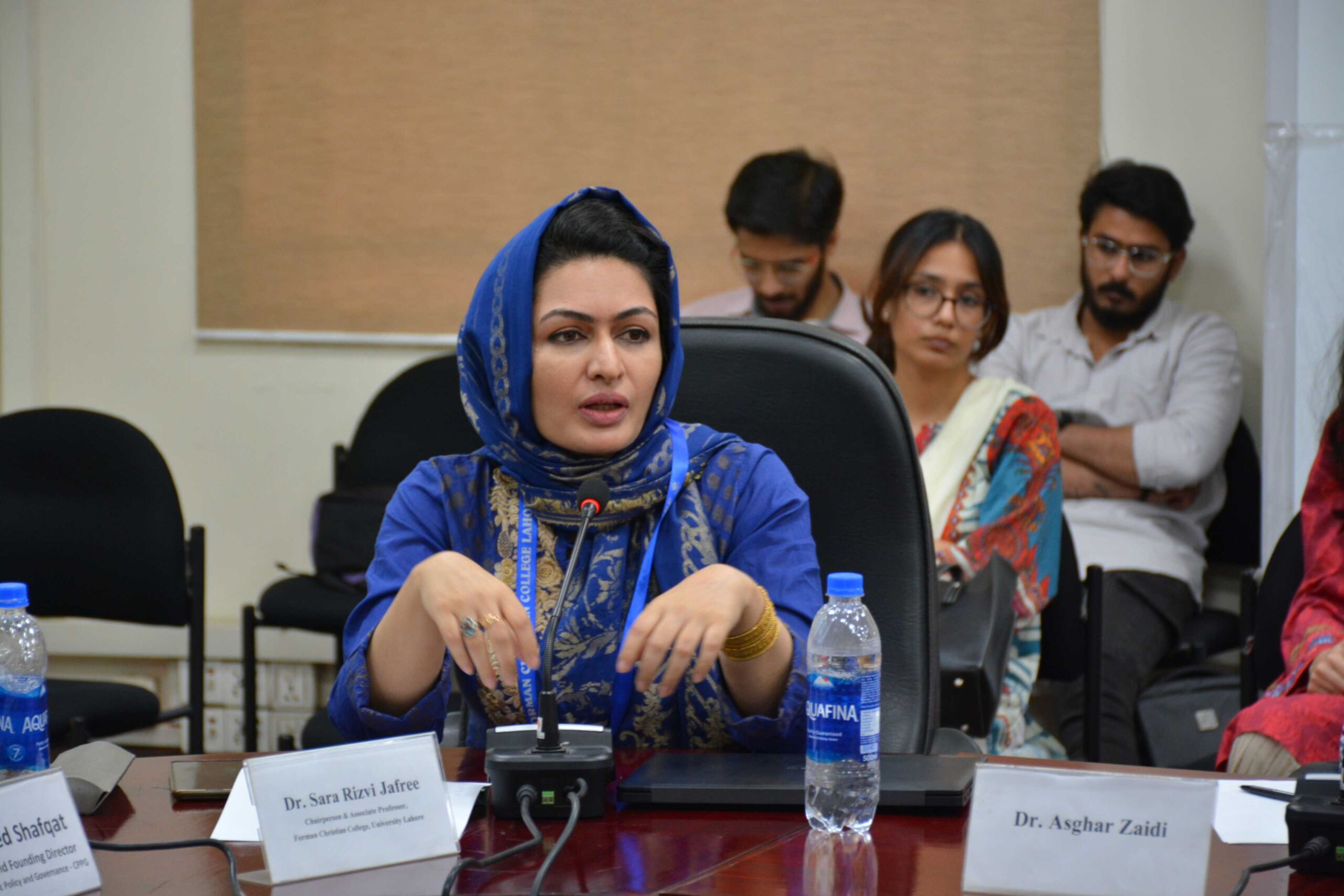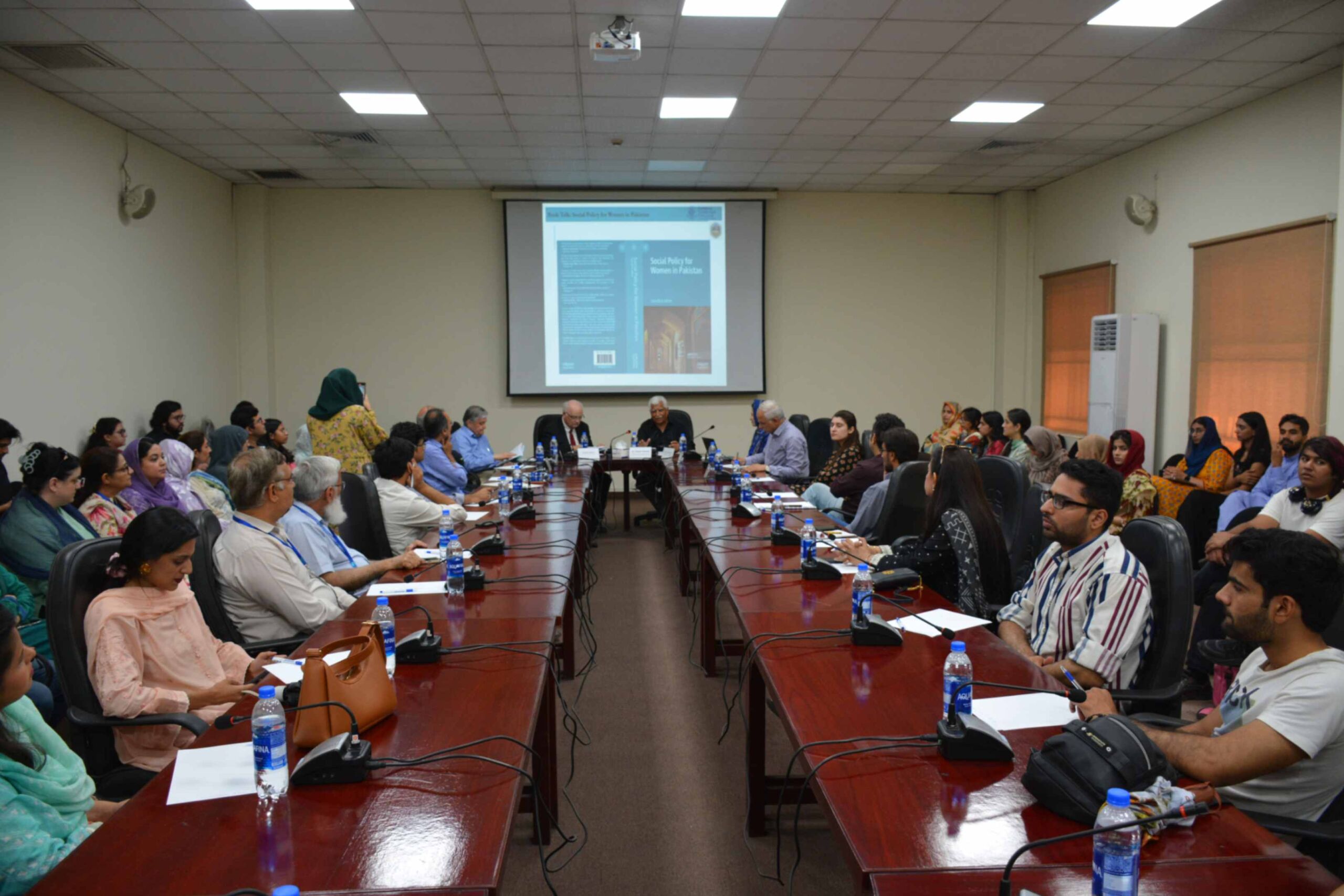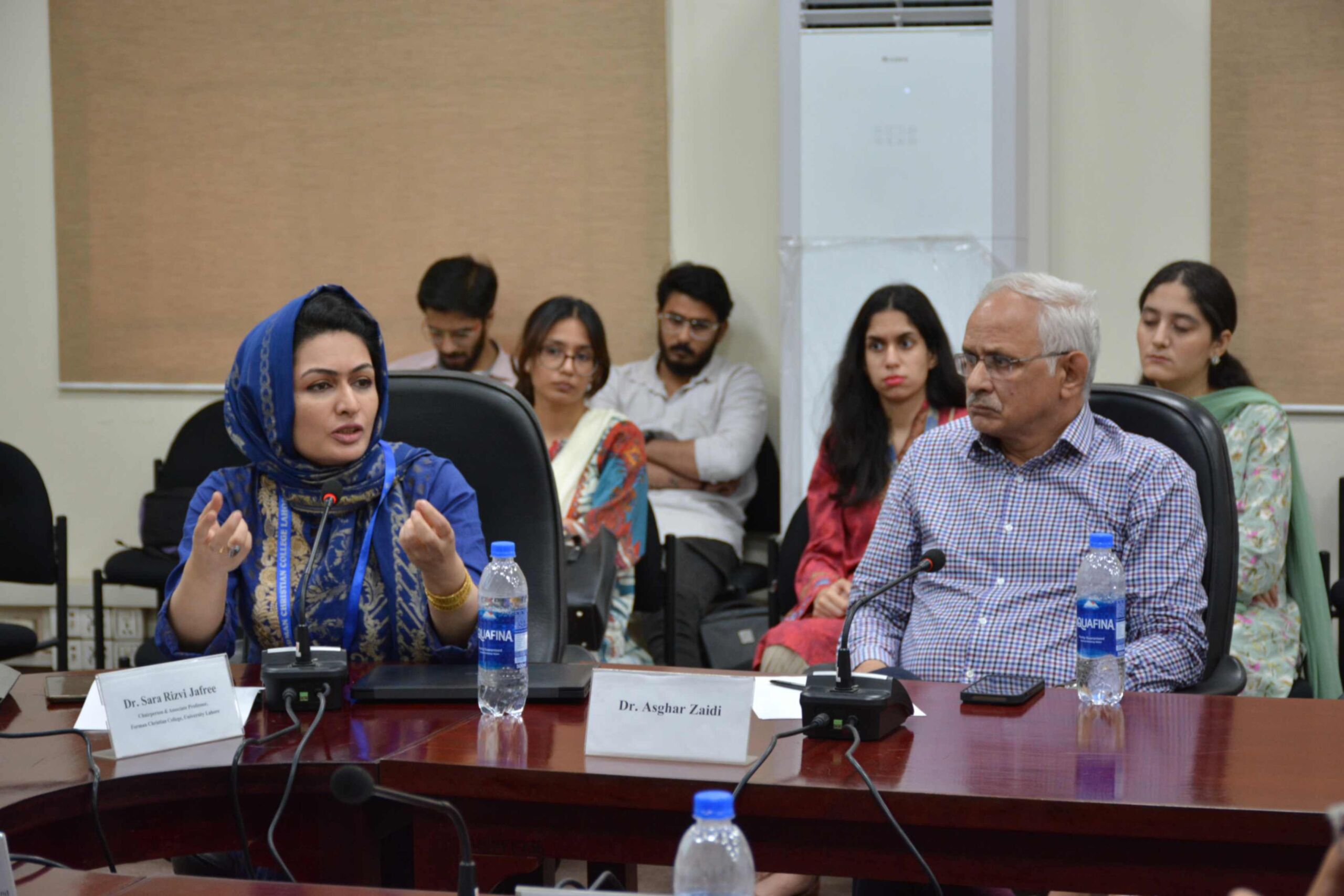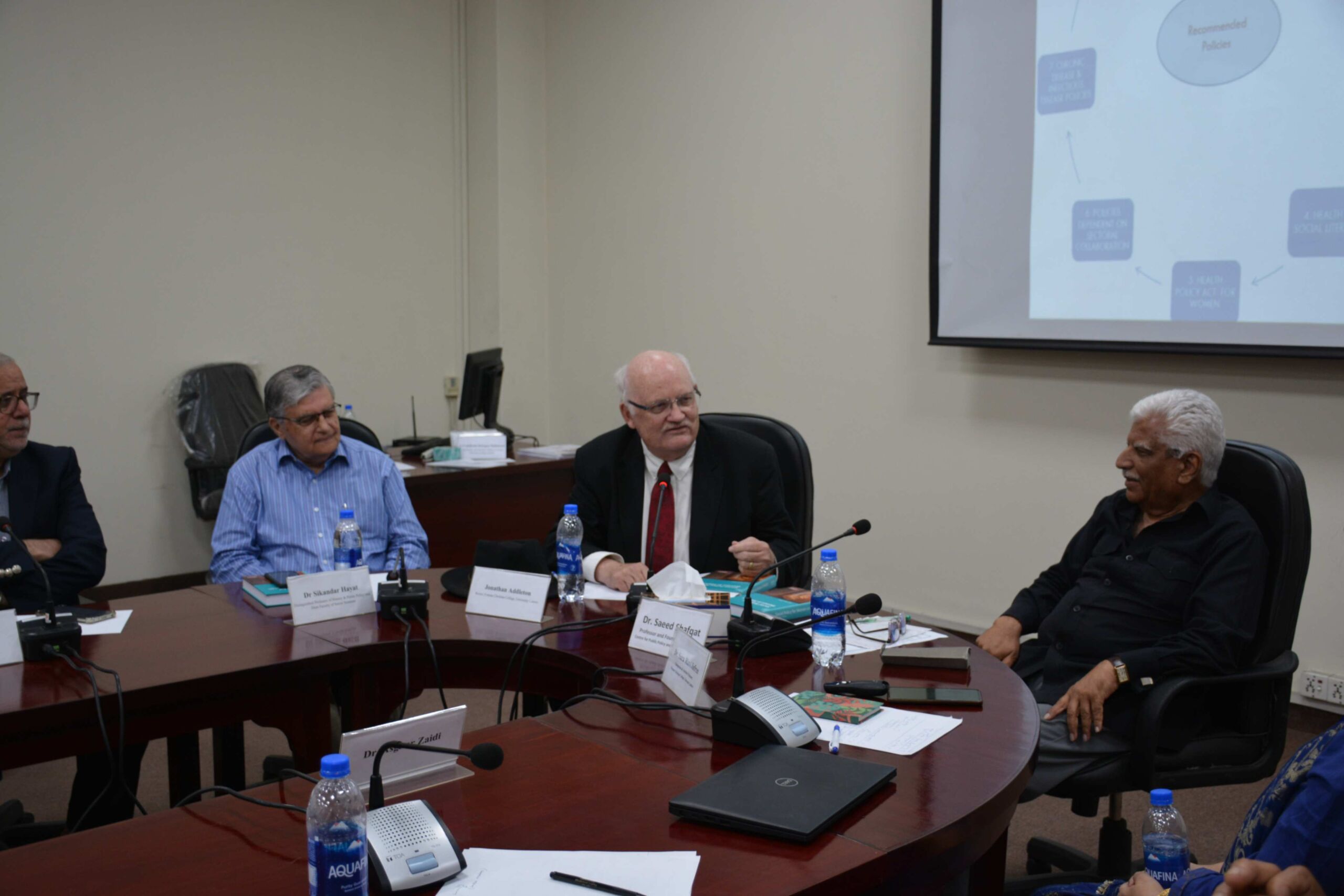
Social Policy for Women in Pakistan
Book Launch
Past Event
May 9, 2024 - 5:00 pm |
May 9, 2024 - 7:00 pm
Dr. Sara Rizvi Jafree
E-002 CPPG FCCU
Upcoming Event
On Thursday, May, 9th, 2024, CPPG organized the book launch of “Social Policy for Women in Pakistan” authored by Dr. Sara Rizvi Jafree. Dr. Jafree is Chairperson and Associate Professor of the Department of Sociology, at Forman Christian College. She has authored two other books, Women, Healthcare and Violence in Pakistan and The Sociology of South Asian Women’s Health. Prof Dr. Asghar Zaidi, a social policy analyst and a former Vice Chancellor of Government College University Lahore presided over the launch. Members from Bait-ul-Maal, UNICEF, and NGOs also joined the session.
Dr. Saeed Shafqat, Founding Director and Professor CPPG, appreciated Dr. Jafree for writing an inspirational, well-researched, and theoretically vigorous book, which raised important concerns while presenting valuable recommendations. Thus, it must be disseminated amongst policymakers, particularly in the Punjab. He added that the book provides a scathing critique and analysis of patriarchy keeping in view the social, cultural, political, and religious context of Pakistan.
Jafree highlighted that the title picture of the book is of the Shah Jahan Mahal, which was funded by Begum Shah Jahan, and used for not just religious purposes, but also for educational and trade activities. Thus, it depicts how women have played the role of leaders since long.
Discussing book contents, Jafree shared that the book is split into two parts. Part One gives an introduction and a theoretical background of the existing social protection plan in Pakistan. It presents a gap analysis by highlighting existing social policies and their limitations. Part Two discusses various social policy areas concerning women: family and housing policy; food security and nutrition policy; environment and disaster protection policy; education and skill development; employment and formal sector inclusion policy; and health policy. Part Three discusses planning prudent pilot projects, the possibility of South Asian collaboration, and using religious leaders and social media for planning holistic social policies for women in Pakistan. This part argues in favor of financing sustainable policy and creating institutional infrastructure, starting from the federal right to the local governance level.
Delving in details, Jafree defined social policy as “an attempt to improve the well-being across the life course of all members of society.” She argued that the mechanisms of welfare and social policies have to be region-specific and culturally appropriate. For example, social protection policies cannot be defined, designed, or advocated as by the West. Similarly, while the United Nations disseminates policy drafts that have worked for Africa, expecting them to work in Pakistan is misplaced. Thus, the role of local researchers, scholars, and organizations is significant in developing indigenous social policies in Pakistan.
Jafree highlighted the enduring trend of the feminization of poverty among Pakistani women over the past few decades. Beyond economic hardships, women in Pakistan are now confronting a myriad of health challenges, also termed as feminization of diseases, encompassing multimorbidity, chronic diseases, infectious ailments, maternal mortality, and mental health issues. Additionally, there’s a concerning rise in the feminization of displacement, particularly affecting refugee and internally displaced women. Furthermore, sectors like agriculture and informal labor are increasingly dominated by women, yet they face persistent vulnerabilities. This gendered landscape extends to various spheres of society, including education, politics, and formal employment, where women remain underrepresented. These issues highlight the inadequacy of women’s protection laws in Pakistan, which, though present, suffer from poor implementation.
Discussing Pakistan’s social protection model, Jafree outlined three main approaches: residual, performance, and institutional distributive. Pakistan predominantly aligns with the residual model i.e. a laissez-faire model characterized by minimal government involvement and selective intervention for the poor. This approach often leads to exclusion and inadequate support, for example in matters of mental health issues and adult skill development. A part of Pakistan’s system comes under the performance model. This model has been implemented in the Asian tiger economies and has worked for them because of their capitalist-driven smaller economies. This model advocates for the provision of social protection to the workers, hoping that the protection would trickle down to their households and dependents as well. However, in reality, all non-workers and informal sector workers don’t have this protection. Contrary to the residual and performance model, the institutional distributive model advocates for universal social protection, similar to Scandinavian economies, which reduces shame and stigmatization. While desirable, this model requires robust taxation and good governance for effective implementation, posing challenges for countries like Pakistan, which may not have an honest and committed government, that is loyal towards social protection.
Discussing the existing social protection schemes in Pakistan, Jafree argued that they demonstrate shortcomings in outreach, beneficiary identification, and fund allocation. Despite the existence of eleven employment security provisions for working women and twenty one schemes for both formal and informal workers, these initiatives often fall short of translating their promises into tangible benefits. Apparently, the Benazir Income Support Program should be benefiting at least 80 million women in Pakistan, but it only covers 9 million so far. The transfer amount is about 5,000 rupees per month that occasionally goes up to 6,000 to 9,000 rupees during emergencies like COVID-19. Thus, while programs like the Benazir Income Support program, and the Lady Health Worker program aim to assist millions, issues such as incomplete beneficiary lists, lack of data, inadequate resources, and limited service coverage persist, hindering program effectiveness. Moreover, cash transfers are small and inconsequential, which cannot help people emerge from poverty.
In the realm of housing and family policy, Jafree added that Pakistan faces challenges due to societal norms, limited data availability, and inadequate infrastructure. The Pakistan Household Integrated Economic Survey has no data about different women family groups like the number of widowed women, women in displaced families, those living in reconstituted relationships, etc. The literature tells us about several issues like child marriage, the husband’s right to divorce, not being able to get child custody, and not receiving iddat allowance after the iddat period. The statistics about household ownership further tell us that 97% of women in Pakistan don’t own their own house. Women who don’t own land, do not have decision-making rights for family planning, the right to choose a husband, etc.
Thus, the issues are multifaceted and complex, emphasizing the need for targeted social policy interventions; comprehensive social protection data collection; and robust and results-based monitoring and accountability systems; to bring overall benefit. Jafree added that the role of religious leaders and the use of social media is paramount in promoting the culture of social policy. As for the financing of social policy, it must be done without external debt by regulating the informal economy and increasing the tax net of Pakistan. We need to relocate the government budget from defense and civil salaries to social policies. The session was followed by a thought-provoking Q/A session.




